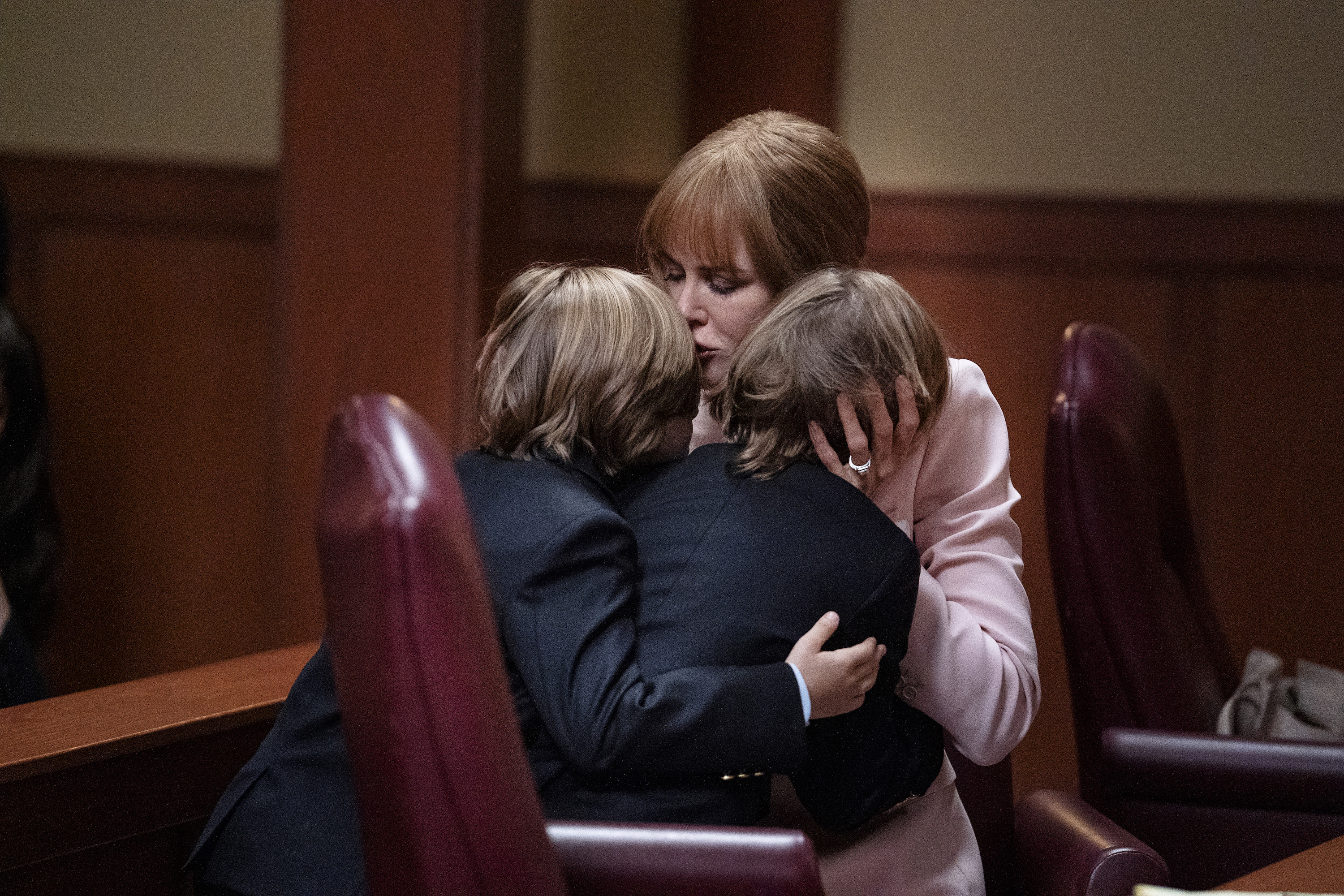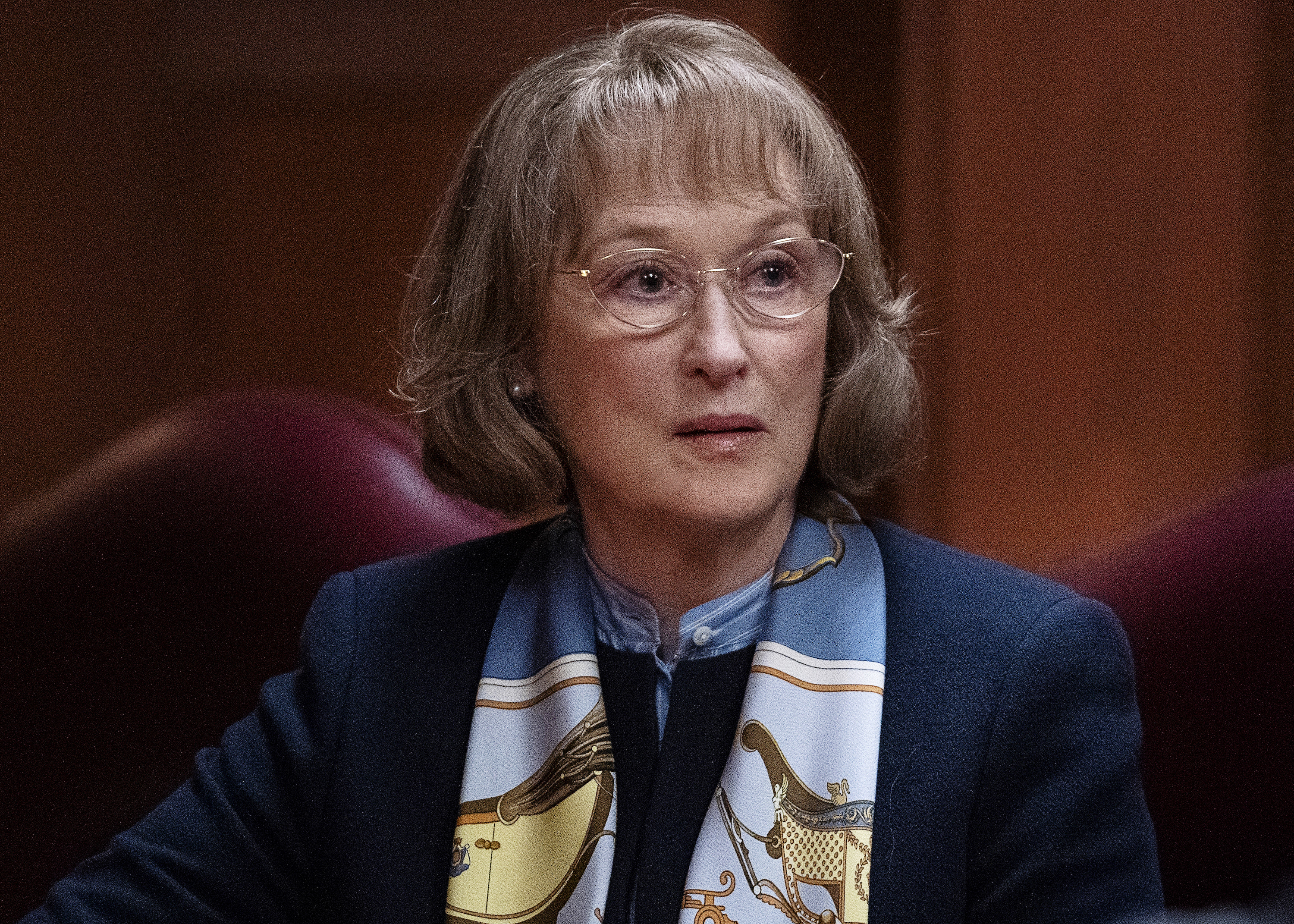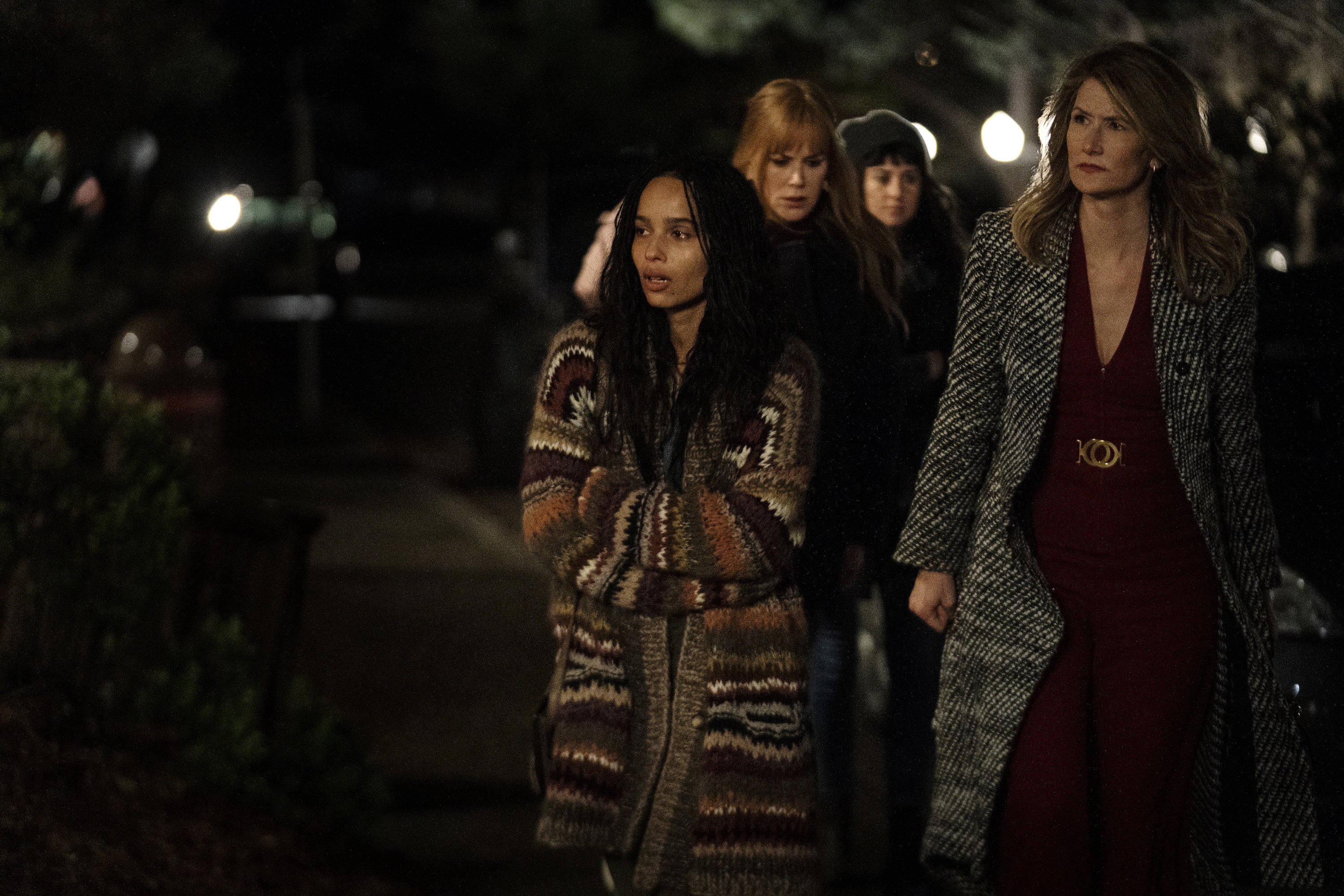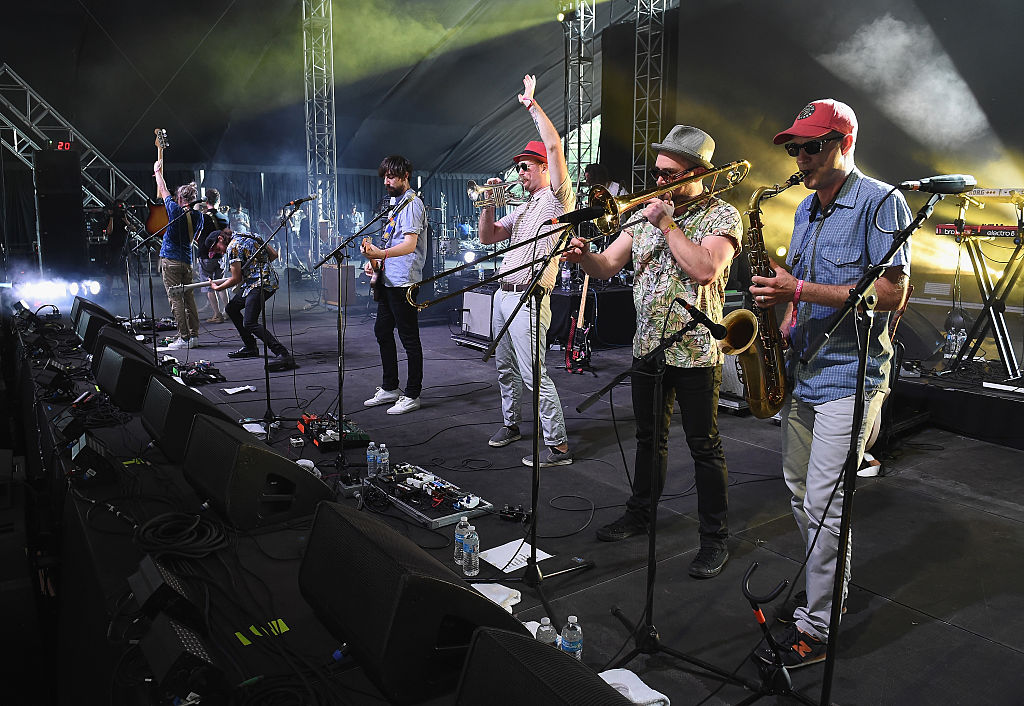The name of the finale of Big Little Lies’ second season, “I Want to Know,” is taken from the chorus of Creedence Clearwater Revival 1970 classic “Have You Ever Seen the Rain?” A new version of the same song, recorded by Willie and Paula Nelson, accompanies the episode’s final dramatic montage. Stripped of its already vague meaning in John Fogerty’s composition, the phrase functions like a playful acknowledgement of the audience’s desire for closure in the show. Thanks to writer David E. Kelley’s annoyingly boilerplate approach to the slow-burn model of serial TV drama storytelling, there was much to clear up going into the final episode. Along with the inevitable verdict in Celeste’s case, there was the white elephant in the room to be dealt with: Would one of the Monterey Five give into their conscience and crack? I want to know, many thought.
As it turns out, though, what BLL’s showrunners and producers wanted us to know was that the show’s drama was not building up to everything it initially seemed to be. Outside of some questionable plot decisions, the episode also didn’t provide a sufficient answer a crucial larger question: What was the comprehensive purpose, or intended purpose, of this muddled followup season to a good show that should have never had a sequel? How did Kelley and director Jean-Marc Vallée’s show go from a visionary experiment in its first season to a dramatically tedious shadow of itself in its second? Season two robbed Big Little Lies of subtlety and mystique, resembling the pseudo-intellectual subjectivity of the more unabashedly pulpy The Affair, incapable of finding resourceful new ways to tell its story.
According to a report published by Indiewire earlier this month, the downturn probably shouldn’t be blamed on the series’ new director Andrea Arnold, a British writer and director renowned for psychologically acute, verité-styled films like Fishtank and Red Road. Arnold reportedly worked from long scripts and built a great deal of trust with her female ensemble cast, teasing out a more complex story than what ended up on-screen. But according to Indiewire, a generous portion of “character exploration and ‘ephemeral stuff’” was axed in the final editing, a process over which Arnold lost control. First-season director Vallée, who was back on the scene during reshoots, reportedly shortened and reordered the season’s episodes, making more extensive use of elements like the flashbacks that dominated the series’ first season, giving the impression of a house style for the show.
 This story is not hard to believe, given the inessential quality of the flashbacks that pervade season two. In season one, Vallée’s flashbacks reflected on the real-time actions of the characters, taking us on roller-coaster journeys through their panic and grief. Here, their deployment seems random. The memories of trauma work like “Previously On” reminders, adding nothing new to our understanding of the story. Certain snippets of memory become associated with certain characters, especially Nicole Kidman’s Celeste and Shailene Woodley’s Jane, and function like theme music announcing their arrival.
This story is not hard to believe, given the inessential quality of the flashbacks that pervade season two. In season one, Vallée’s flashbacks reflected on the real-time actions of the characters, taking us on roller-coaster journeys through their panic and grief. Here, their deployment seems random. The memories of trauma work like “Previously On” reminders, adding nothing new to our understanding of the story. Certain snippets of memory become associated with certain characters, especially Nicole Kidman’s Celeste and Shailene Woodley’s Jane, and function like theme music announcing their arrival.
Much of this season’s flashbacks rehash events we knew about already, and what little of it we didn’t know—about Bonnie’s (Zoe Kravitz) abusive upbringing, or a traumatic moment from Perry’s past that is foisted on us at the exact moment the plot needs it—is underdone and unjustified. It often feels as if the surrounding scenes that give weight to these plot points were ripped out, and if you believe Indiewire’s report on the show’s troubled genesis, that might be pretty close to the truth. Elsewhere, one wonders if Vallée and the HBO reshoot illuminati accidentally included doubles of the same scene, or at least two scenes serving precisely the same purpose. This might include Adam Scott and Reese Witherspoon litigating their marriage in their kitchen or in the car for the fifth or fifteenth time, Kidman at home snuggling with her children after a day full of challenges to her fitness as a mother, or even Meryl Streep running into someone and gently murmuring an underhanded insult in a mall or coffee shop.
Despite its myriad faults, Big Little Lies’ second season will doubtless get plenty of the award-show acting nominations it is so obviously is gunning for. You could argue that it’s deserving: The cast includes several of the greatest Hollywood-reared actors working, and they are all doing their job to the best of their ability. But what is Good Acting worth in a dramatic universe so otherwise void of inspiration? Is it even possible? Here, I do not simply refer to Kidman’s pulls between vulnerability and righteous command in the courtroom, or Laura Dern’s uproarious tirades against Jeffrey Nordling, but to the curious Meryl Streep ex machina: the veteran actor’s turn as Mary-Louise Wright, the suspicious and quietly vindictive mother of Kidman’s late husband.
 From her meme-ready dinner table scream in the premiere onward, the inclusion of Streep’s character seemed an obvious bid to sustain viewer interest throughout the second season of a show which clearly had only enough ideas for one season—an attempt to keep fans watching and tweeting without noticing the show’s fundamental structure lying collapsed in front of them. Streep, who could deliver a teachable performance in an Adam Sandler movie, works overtime to distract the viewer from the banality and empty cyclicality of David E Kelley’s scripts. Sometimes, it’s possible to forget that she is being forced to recycle rephrased versions of the same comically literal lines over and over again. (“I just want what is best for the children,” “I believe that Celeste is a good mother,” so on.)
From her meme-ready dinner table scream in the premiere onward, the inclusion of Streep’s character seemed an obvious bid to sustain viewer interest throughout the second season of a show which clearly had only enough ideas for one season—an attempt to keep fans watching and tweeting without noticing the show’s fundamental structure lying collapsed in front of them. Streep, who could deliver a teachable performance in an Adam Sandler movie, works overtime to distract the viewer from the banality and empty cyclicality of David E Kelley’s scripts. Sometimes, it’s possible to forget that she is being forced to recycle rephrased versions of the same comically literal lines over and over again. (“I just want what is best for the children,” “I believe that Celeste is a good mother,” so on.)
By the final episode, however, it becomes impossible to ignore. “I Want to Know” seems designed to annoy more than half of the show’s audience, with the remaining portion expected to sanctimoniously justify why the episode’s ambiguity is meaningful: an appropriate final illustration of how seriously this season of television took itself without earning it. The ending literalized what little Kelley had the good taste to leave unsaid until that point, stoking topical #MeToo associations—or whacking them on the head with a large foam mallet—in climactic courtroom scenes, and bringing the non-Kidman storylines to laughably trivial conclusions. (The end of Woodley’s embattled attempts at romance, and Witherspoon and Scott’s painfully on-the-nose solution to reigniting the spark in their marriage, were particularly feeble.) Kelley’s plan to tie together the episode may have been as simple as inserting as many lines as possible about the importance of putting a stop to “lies”—both big and little, no doubt.
The shadow of True Detective’s farcically indulgent second season still looms large at HBO; this is my theory. Even with a universally respected auteur in the driver’s seat for this season of Big Little Lies, perhaps the powers that be still feared an unbridled vision that would alter the show audiences fell in love with beyond recognition. The result of this groupthink is worse than mediocrity; it’s an empty pastiche that does a disservice to the big themes it attempts to address, and to the top-notch female director and actors that did their best to breathe life into it.





